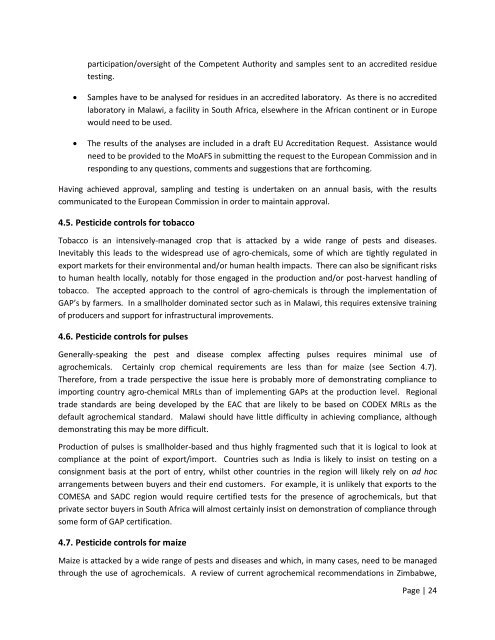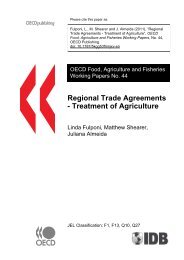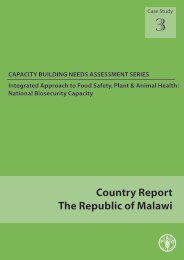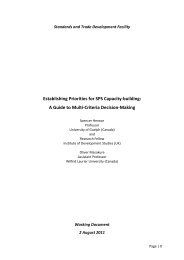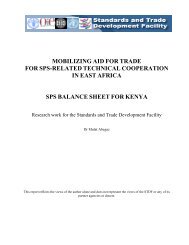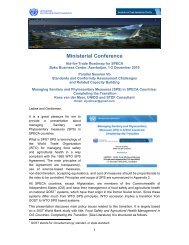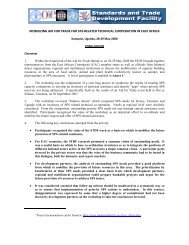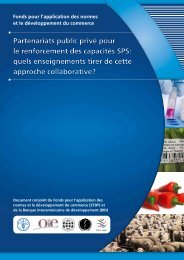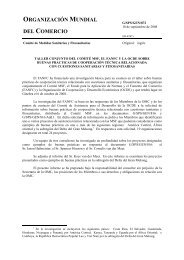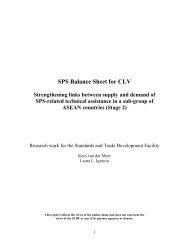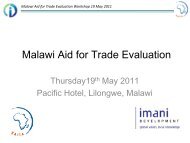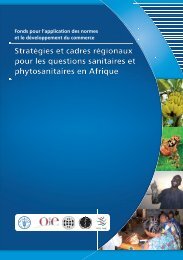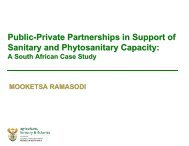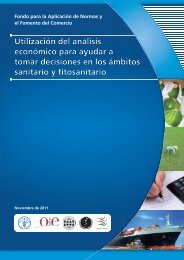MCDA Final Report Malawi - Standards and Trade Development ...
MCDA Final Report Malawi - Standards and Trade Development ...
MCDA Final Report Malawi - Standards and Trade Development ...
You also want an ePaper? Increase the reach of your titles
YUMPU automatically turns print PDFs into web optimized ePapers that Google loves.
participation/oversight of the Competent Authority <strong>and</strong> samples sent to an accredited residue<br />
testing.<br />
<br />
<br />
Samples have to be analysed for residues in an accredited laboratory. As there is no accredited<br />
laboratory in <strong>Malawi</strong>, a facility in South Africa, elsewhere in the African continent or in Europe<br />
would need to be used.<br />
The results of the analyses are included in a draft EU Accreditation Request. Assistance would<br />
need to be provided to the MoAFS in submitting the request to the European Commission <strong>and</strong> in<br />
responding to any questions, comments <strong>and</strong> suggestions that are forthcoming.<br />
Having achieved approval, sampling <strong>and</strong> testing is undertaken on an annual basis, with the results<br />
communicated to the European Commission in order to maintain approval.<br />
4.5. Pesticide controls for tobacco<br />
Tobacco is an intensively-managed crop that is attacked by a wide range of pests <strong>and</strong> diseases.<br />
Inevitably this leads to the widespread use of agro-chemicals, some of which are tightly regulated in<br />
export markets for their environmental <strong>and</strong>/or human health impacts. There can also be significant risks<br />
to human health locally, notably for those engaged in the production <strong>and</strong>/or post-harvest h<strong>and</strong>ling of<br />
tobacco. The accepted approach to the control of agro-chemicals is through the implementation of<br />
GAP’s by farmers. In a smallholder dominated sector such as in <strong>Malawi</strong>, this requires extensive training<br />
of producers <strong>and</strong> support for infrastructural improvements.<br />
4.6. Pesticide controls for pulses<br />
Generally-speaking the pest <strong>and</strong> disease complex affecting pulses requires minimal use of<br />
agrochemicals. Certainly crop chemical requirements are less than for maize (see Section 4.7).<br />
Therefore, from a trade perspective the issue here is probably more of demonstrating compliance to<br />
importing country agro-chemical MRLs than of implementing GAPs at the production level. Regional<br />
trade st<strong>and</strong>ards are being developed by the EAC that are likely to be based on CODEX MRLs as the<br />
default agrochemical st<strong>and</strong>ard. <strong>Malawi</strong> should have little difficulty in achieving compliance, although<br />
demonstrating this may be more difficult.<br />
Production of pulses is smallholder-based <strong>and</strong> thus highly fragmented such that it is logical to look at<br />
compliance at the point of export/import. Countries such as India is likely to insist on testing on a<br />
consignment basis at the port of entry, whilst other countries in the region will likely rely on ad hoc<br />
arrangements between buyers <strong>and</strong> their end customers. For example, it is unlikely that exports to the<br />
COMESA <strong>and</strong> SADC region would require certified tests for the presence of agrochemicals, but that<br />
private sector buyers in South Africa will almost certainly insist on demonstration of compliance through<br />
some form of GAP certification.<br />
4.7. Pesticide controls for maize<br />
Maize is attacked by a wide range of pests <strong>and</strong> diseases <strong>and</strong> which, in many cases, need to be managed<br />
through the use of agrochemicals. A review of current agrochemical recommendations in Zimbabwe,<br />
Page | 24


